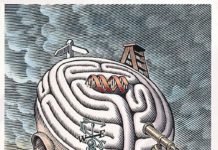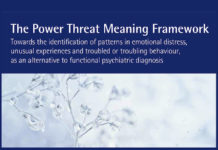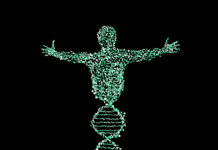Hereditary Madness? The Genain Sisters’ Tragic Story
The story of the Genain quadruplets has long been cited as evidence proving something about the supposed hereditary nature of schizophrenia. But who wouldn’t fall apart after surviving a childhood like theirs? The doctors attributed their problems to menstrual difficulties or excessive masturbation — anything except abuse.
ADHD Diagnosis Based on “Illogical Rhetoric,” Analysis Claims
In a philosophically rigorous article, Spanish researcher Marino Pérez-Álvarez examines the logic of attention-deficit hyperactivity disorder (ADHD).
Trauma, Psychosis, and Dissociation
Recent years have seen an influx of numerous studies providing an undeniable link between childhood/ chronic trauma and psychotic states. Although many researchers (i.e., Richard Bentall, Anthony Morrison, John Read) have been publishing and speaking at events around the world discussing the implications of this link, they are still largely ignored by mainstream practitioners, researchers, and even those with lived experience. While this may be partially due to an understandable (but not necessarily defensible) tendency to deny the existence of trauma, in general, there are also certainly many political, ideological, and financial reasons for this as well.
Mental Health Concerns Not “Brain Disorders,” Say Researchers
The latest issue of the journal Behavioral and Brain Sciences features several prominent researchers arguing that mental health concerns are not “brain disorders.”
Bipolar Diagnosis Linked to Childhood Adversity
With the ties between traumatic childhood experiences and mental health issues, should we continue to focus on biological approaches?
Schizophrenia Deconstructed
After a few weeks it became clear to me the complete lack of comprehension that I faced as a person claiming to have been cured of psychosis. Being a schizophrenic claiming to no longer suffer from schizophrenia only made me seem more schizophrenic due to the current culture of psychiatry.
The Real Myth of the Schizophrenogenic Mother
Acknowledging the role of trauma inflicted by a given individual’s mother is not the same as laying all blame for “mental illness” at the feet of motherhood. Meanwhile, a mountain of evidence has accumulated linking schizophrenia to sexual, physical, and emotional abuse and many other categories of adverse childhood experiences.
United Nations Report Calls for Revolution in Mental Health Care
In a new report, the United Nations Special Rapporteur on the right to health, Dr. Dainius Pūras, calls for a move away from the biomedical model and “excessive use of psychotropic medicines.”
Mental Health Professionals Critique the Biomedical Model of Psychological Problems
While a great deal of the excitement about advances in psychological treatments comes from the potential for research in neuroscience to unlock the secrets of the brain, many mental health experts would like to temper this enthusiasm. A special issue of the Behavior Therapist released this month calls into question the predominant conception of mental illnesses as brain disorders.
Study Finds Heavy Metal Music Beneficial to Mental Health
A new study highlights the role heavy metal music plays in the mental health of adolescents facing adversity.
Duty to Warn – 14 Lies That Our Psychiatry Professors in Medical School Taught...
Revealing the false information provided about psychiatry should cause any thinking person, patient, thought-leader or politician to wonder: “how many otherwise normal or potentially curable people over the last half century of psych drug propaganda have actually been mis-labeled as mentally ill (and then mis-treated) and sent down the convoluted path of therapeutic misadventures – heading toward oblivion?”
Victim Blaming: Childhood Trauma, Mental Illness & Diagnostic Distractions?
Why, despite the fact that the vast majority of people diagnosed with a mental illness have suffered from some form of childhood trauma, is it still so difficult to talk about? Why, despite the enormous amount of research about the impact of trauma on the brain and subsequent effect on behaviour, does there seem to be such an extraordinary refusal for the implication of this research to change attitudes towards those who are mentally ill? Why, when our program and others like it have shown people can heal from the effects of trauma, are so many people left with the self-blame and the feeling they will never get better that my colleague writes about below?
Fighting for the Meaning of Madness: An Interview with Dr. John Read
Akansha Vaswani interviews Dr. John Read about the influences on his work and his research on madness, psychosis, and the mental health industry.
Trauma Resiliency Model: A New Somatic Therapy for Treating Trauma
Report presents new body-based therapeutic approach for shock and complex developmental trauma.
Long-term Usage of ADHD Drugs Linked to Growth Suppression
Findings suggest that treatment not only fails to reduce the severity of “ADHD” symptoms in adulthood but is associated with decreased height.
Against the Odds: ‘Unimproved Schizophrenic’ to Yale PhD
Forty years after I had first been admitted to the hospital, I was ready to confront my past. So, I sent for my hospital records, and I read them. As an experienced clinician, I recognized immediately what the doctors hadn’t been able to see in 1960: my problem wasn’t ‘schizophrenia’ but PTSD, connected with incest.
This is the Truth About Personality Disorders
From The Independent: Armchair diagnoses of personality disorders are a rising trend, from speculations that President Trump has narcissistic personality disorder to viral articles about discerning...
Mental Health Professionals and Patients Often Disagree on Causes of Symptoms
A new study finds that clinicians’ disregard for mental health patients’ insight into their own condition may be detrimental to treatment.
Violence Caused by Antidepressants: An Update after Munich
The media is now reporting details about the 18-year-old who shot and killed nine and wounded many others before killing himself on July 22 in Munich. My clinical and forensic experience leads to a distinction among people who murder under the influence of psychiatric drugs. Those who kill only one or two people, or close family members, often have little or no history of mental disturbance and violent tendencies. The drug itself seems like the sole cause of the violent outburst. On the other hand, most of those who commit mass violence while taking psychiatric drugs often have a long history of mental disturbance and sometimes violence. For these people, the mental health system seems to have provoked increasing violence without recognizing the danger.
When Minds Crack, The Light Might Get In: A Spiritual Perspective on Madness
You can’t go back to mundane ways of seeing the world after very dark things happen. Trauma cracks open a hole in our lives and in our minds, throwing us into the zone where we face the big spiritual questions. Bad ideas can get in when things open up like that. But it’s also possible that something new and positive can get in.
The Power Threat Meaning Framework One Year On
The team that developed the Power Threat Meaning framework as a diagnostic alternative reflects on the response to the framework after one year.
Belongingness Can Protect Against Impact of Trauma, Study Suggests
A new study explores feelings of belongingness as a protective factor for childhood trauma and adult mental health outcomes.
Researchers Question Link Between Genetics and Depression
A new study, published in the journal Molecular Psychiatry, found no link between genetics and the occurrence of depressive symptoms.
Combining Art Therapy and Mindfulness for Refugees
A new article, published in The Arts in Psychotherapy, describes the ways art therapy and mindfulness have benefitted refugees and asylum seekers in Hong Kong.
Philosophers Challenge Psychiatry and its Search for Mechanisms of Disorder
Attempting to locate the mechanisms of psychiatric disorder is a step in the wrong direction and fails to challenge potentially unjust social practices.





























